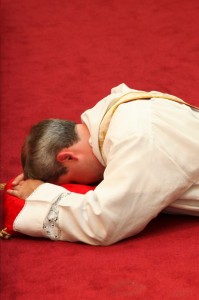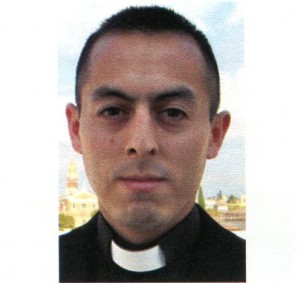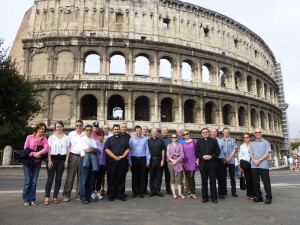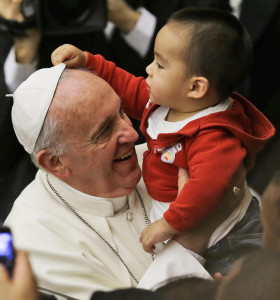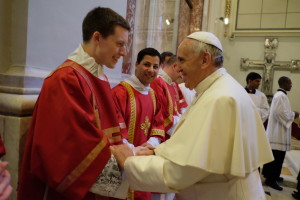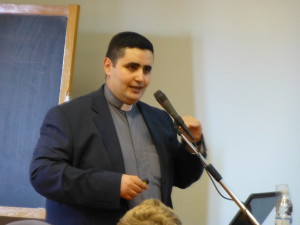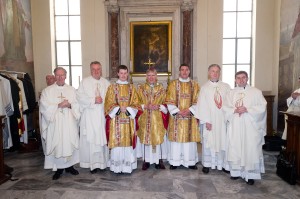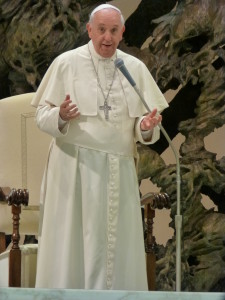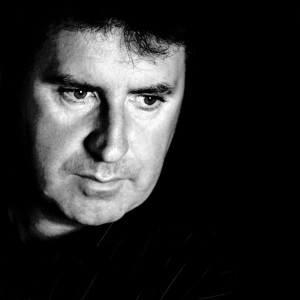Ordinations to the Priesthood
Posted on 07. Oct, 2014 by John Coughlan in Carousel
Ordinations to the Priesthood
Congratulations to the following former seminarians of the Irish College, who were ordained to the Priesthood during Summer-Autumn 2014:
Fr Dominic McGrattan was ordained for the Diocese of Down and Connor by Bishop Noël Treanor on Sunday, 29th June 2014 in St Patrick’s Church, Portaferry, Co. Down.
Fr Liam Boyle was ordained for the Diocese of Raphoe by Bishop Philip Boyce OCD on Sunday, 7th September 2014 in the Cathedral of St Eunan, Letterkenny, Co. Donegal.
Fr Declan Kelly was ordained for the Diocese of Meath by Bishop Michael Smith on Sunday, 21st September 2014 in the Cathedral of Christ the King, Mullingar, Co. Westmeath.
Doctoral Defence: Fr Juan Medina Coronel
Posted on 07. Oct, 2014 by John Coughlan in Carousel
Congratulations to Fr Juan Manuel Medina Coronel , of the Diocese of Chiclayo, Peru, of the Irish College postgraduate community, who successfully defended his thesis, ‘La integridad de la naturaleza humana de Cristo en las Cartas Teológicas de Gregorio de Nacianzo – La presencia del “nous” humano en el Encarnado: razones y consecuencias’ at Santa Croce University on 5th September 2014. His moderator was Rev. Prof. Giulio Maspero.
Walk to Church
Posted on 21. Sep, 2014 by John Coughlan in Carousel
The Irish College participated in the ‘Walk to Church’, an initiative of solidarity to support the displaced Christians and minority communities of Iraq and Syria in a prayerful way on Sunday, 21st September 2014.
A group gathered at the Colosseum at 09.30, and walked together to the 10.00 Mass at the Irish College.
For photos and a video clip, click here.
A Time for Priests 2014
Posted on 13. Sep, 2014 by John Coughlan in Carousel
A Time for Priests
Priests as Shepherds in the Family of the Church
15th – 19th September 2014
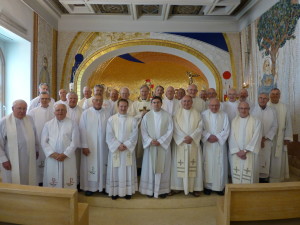 The participating priests with the Irish College formation staff.
The participating priests with the Irish College formation staff.
The Pontifical Irish College Rome hosted a time of reflection, renewal and relaxation, from 15th to 19th September 2014, for priests, to avail of an opportunity to spend some days in Rome, close to the ministry of Pope Francis and in anticipation of the forthcoming Synod on the family. The course provides participants with an opportunity to visit Rome while deepening their theological awareness through lectures and lived experience of the Church and City.
Those leading this year’s course included:
Fr. Brendan Purcell, Emeritus Lecturer, Department of Philosophy, UCD.
Archbishop Vincenzo Paglia, President of the Pontifical Council for the Family.
Fr. Michael Paul Gallagher SJ, Pontifical Gregorian University.
Fr. Tom Norris, Spiritual Director, Pontifical Irish College, Rome.
Liturgies were celebrated each day in the College Chapel with its beautiful Marko Rupnik mosaics and in other Churches and Basilicas in Rome and beyond. A general audience with the Holy Father, a trip to Montecassino, a day of reflection and recollection as well as an opportunity to enjoy many of the artistic and cultural delights of Rome formed part of this year’s programme.
For the flyer which was distributed for the 2014 Time for Priests, please click here Time for Priests flyer 2014
For enquiries about the 2015 Time for Priests, please email ufficio@irishcollege.org
A Course for Parishioners 2014
Posted on 12. Sep, 2014 by John Coughlan in Carousel
The Joy of the Gospel
Family, Church and Pope Francis; A course for Parishioners
8th – 12th September 2014
During these days in the city of the apostles Peter and Paul, participants were afforded an opportunity to reflect on Pope Francis’ call to live the Joy of the Gospel. The week included a series of talks, liturgies and guided visits to significant Churches and Basilicas in Rome, a day of spiritual recollection and reflection as well as a pilgrimage to the shrine of St. Francis at Assisi and an opportunity to attend a General Audience with Pope Francis.
Presentations were given by the following:
- Msgr. Ciarán O’Carroll (Pontifical Irish College, Rome) visited St. Peter’s Basilica, the Basilica of St. John Lateran and the Church of St. Peter in Chains, and drew together the theme of family in the early centuries of Christian life in Rome.
- Dr Patricia Kieran (Mary Immaculate College, Limerick) examined the Pope’s Apostolic Exhortation and its implications for faith formation and the family.
- Fr. Tom Norris (Pontifical Irish College, Rome) led a reflection on ‘The Art of Loving – the Secret for Church and Family’.
- Fr. George Hayes (Pontifical Irish College, Rome) looked at the use of art and the aesthetic in nurturing one’s relationship with God.
- Fr. Hugh Clifford (Pontifical Irish College, Rome) gave input on the area of family, vocation and formation.
If you wish to express an interest for next year, please telephone the Irish College on the main office number at 00 39 06 772 631 or email ufficio@irishcollege.org
Pontifical Irish College, Via Dei S.S. Quattro, 1, 00184 Rome
For the flyer for the course, please click here: Time for Parishioners flyer 2014
To see photographs from the course, click here.
Irish College seminarians serving Pentecost Papal Mass
Posted on 08. Jun, 2014 by John Coughlan in Carousel
The seminarians of the Pontifical Irish College, Rome, served at Pentecost Sunday Mass at St Peter’s Basilica, celebrated by Pope Francis, on 8th June 2014.
To view the video of the Mass, click here and choose ‘video on demand’. Choose language for the commentary.
For photographs of the members of the Irish College seminary community participating in the ceremony, click here.
Doctoral Defence: Fr Samer Soreshow Yohanna
Posted on 05. Jun, 2014 by John Coughlan in Carousel
Doctoral Defence of Fr Samer Soreshow Yohanna
Congratulations to Fr Samer Soreshow Yohanna, O.A.O.C. , from Iraq, of the Irish College postgraduate community, who successfully defended his thesis, ‘The Gospel of Mark in the Syriac Harklean Version: An Edition Based upon the Earliest Witnesses’ at the Pontifical Biblical Institute on 5th June 2014. His moderator was Rev. Prof. Craig Morrison, O.Carm.
To view photographs from the occasion, click here.
Two new Deacons ordained
Posted on 25. May, 2014 by John Coughlan in Carousel
Picture shows: Left to right: Fr Tom Norris (Spiritual Director), Monsignor Ciarán O’Carroll, Rector, Rev. Conor McCarthy (new Deacon, Diocese of Down and Connor), Bishop John Buckley (ordaining Bishop), Rev. Marius O’Reilly (new Deacon, Diocese of Cork and Ross), Fr George Hayes (Vice Rector), Fr Hugh Clifford (Director of Formation).
Two new Deacons ordained
A former marketing consultant, and a music graduate, both students of the Pontifical Irish College in Rome were ordained deacons today by Bishop John Buckley, Bishop of Cork & Ross. The liturgy was celebrated in the Basilica of Santa Croce in Gerusalemme, Rome, a fourth century church which contains relics of the Cross of Christ, brought to Rome by Emperor Constantine’s mother Helena in AD 325.
Reverend Marius O’Reilly (37) from Ballincollig in Cork, and Reverend Conor McCarthy (26) from Finaghy in Belfast, were ordained by Bishop Buckley who travelled to Rome for the occasion.
In a moving ceremony, in which the two new deacons were joined by over one hundred family members and friends who travelled from Ireland, Bishop Buckley reminded the two deacons that, “the purpose of the deacon and priest is to serve God’s people and to bring Good News of the gospel”. Bishop Buckley continued, “Your ministry needs to reach out to people with that Good News, as Pope Francis has urged us all ‘to keep their eyes fixed on Jesus Christ’; as only in Him will you find the truth and happiness for which they are searching.”
Reverend O’Reilly is a graduate of University College Cork and of the Smurfit Business School of University College Dublin, while Reverend McCarthy is a graduate of Queen’s University Belfast. The two deacons will be ordained to the priesthood in the next year for service in their respective dioceses of Cork & Ross and Down & Connor.
Monsignor Ciarán O’Carroll, Rector of the Pontifical Irish College, Rome, congratulated the two new deacons and commented that their ordination was a sign of the “continuing courage and generosity of people as they commit themselves to serving the Gospel of Jesus Christ. Pope Francis constantly reminds us that the world needs Good News. As deacons and future diocesan priests, you are called to be messengers of hope and mercy and proclaimers of the joy of the Gospel. May God bless you in your ministry.”
To see more photographs from the day, click here.
Pope Francis talking with seminarians and priests
Posted on 24. May, 2014 by John Coughlan in Carousel
Pope Francis talks with seminarians and priests studying in Rome
On Monday, 12th May 2014 at the Paul VI Audience Hall at the Vatican, Pope Francis gave a special audience for seminarians and priests studying in Rome. The Irish College community was well represented at the occasion. In response to questions, he reflected with wisdom, wit, and passion on several dimensions of formation and priestly life.
Here are the questions and responses:
Good morning, and I thank you very much for this presence. I thank Cardinal Stella for his words, and I apologize for the delay. Yes, because the Mexican Bishops are here on their ad limina visit … and when one is with Mexicans, one feels so well, so well, that time passes without noticing it!
To the 146 of you who are from countries in the Middle East, and also to some of you from Ukraine, I want to say that I am very close to you at this moment of suffering: truly, very close, and in prayer. There is so much suffering in the Church; the Church suffers so much, and the suffering Church is also the persecuted Church in some parts, and I am close to you. Thank you. And now I would like…. There were some questions, I have seen them, but if you wish to change them or make them somewhat more spontaneous, there’s no problem, do so with all liberty!
Good morning, Holy Father. My name is Daniel. I come from the United States, I am a Deacon at the North American College. We have come to Rome above all for an academic formation and to keep faith in this commitment. How do we not neglect an integral priestly formation, either at the personal or community level? Thank you.
Thank you for the question. It is true; your main purpose here is academic formation: to get a degree in this or that…. However, there is the danger of academicism. Yes, the bishops send you here so that you can earn a degree, but they also do so in order that you may return to the diocese. However, in dioceses you must work in the presbytery as presbyters, graduate presbyters. And if one falls into this danger of academicism, it isn’t Father who returns but the “doctor”. And this is dangerous. There are four pillars in priestly formation: I have said this so many times, perhaps you have already heard it. Four pillars: spiritual formation, academic formation, community formation and apostolic formation. It’s true that here in Rome emphasis is placed — since this is why you were sent — on intellectual formation; however, the other three pillars must be cultivated, and all four interact among themselves, and I wouldn’t understand a priest who comes to get a degree in Rome and does not have a community life. This is not all right. Either he is not taking care of his spiritual life — daily Mass, daily prayer, lectio divina, personal prayer with the Lord — or his apostolic life: on the weekend doing something, for a change of air, but also the apostolic air, doing something there…. It’s true that study is an apostolic dimension; but it is important that the other three pillars are also looked after! Academic purism is not beneficial, it is not beneficial. And this is why I liked your question, because it gives me the opportunity to tell you these things. The Lord has called you to be priests, to be presbyters: this is the fundamental rule.
And there is something else that I would like to stress: if only the academic part is considered, there is a danger of sliding into ideologies, and this makes one sick. And it also sickens one’s conception of the Church. To understand the Church, one must understand her through study but also through prayer, through community life and through apostolic life. When we slide into an ideology and go down this road, we will have a non-Christian hermeneutic, a hermeneutic of an ideological Church. And this is harmful, it is an illness. One’s hermeneutic of the Church has to be the hermeneutic which the Church herself offers us, which the Church herself gives us. To perceive the Church with the eyes of a Christian; to understand the Church with the mind of a Christian; to understand the Church with the heart of a Christian; to understand the Church through Christian works. Otherwise one does not understand the Church, or understands her poorly. Therefore, yes, it is important to emphasize academic study because that is why you were sent here, but do not neglect the other three pillars: the spiritual life, community life and the apostolic life. I don’t know if this answers your question…. Thank you.
Good morning, Holy Father. I am Thomas from China. I am a seminarian at the Collegio Urbano. Sometimes living in community isn’t easy: what advice would you give us, based on your own experience, for making our community a place of human and spiritual growth and of the exercise of priestly charity?
Once, an old bishop from Latin America said: “The worst seminary is better than no seminary”. If one prepares for the priesthood alone, without a community, this is harmful. The life of the seminary, that is, community life, is very important. It is very important because there is sharing among brothers who are journeying towards the priesthood; but there are also problems, there are battles: battles for power, battles over ideas, even hidden struggles; and the capital vices arise: envy, jealousy…. And good things also arise: friendships, the exchange of ideas, and this is what is important for community life. Community life isn’t paradise, it’s at least purgatory — no, it’s not that … [they laugh], but it’s not paradise! A Jesuit saint said that the greatest penance for him was community life. It’s true, isn’t it? Therefore, I think we must go forward in community life. But how? There are four or five things that will help us a great deal. Never, never speak ill of others. If I have something against another, or if I don’t agreed with him: I have to tell him to his face! But we clerics are tempted not to speak to another to his face, to be too diplomatic, that clerical language…. However, it harms us, it harms us! I remember once, 22 years ago, I had just been appointed bishop and in that vicariate I had as secretary — Buenos Aires is divided into four vicariates — a young recently ordained priest. And in the first months, I did something, I took a somewhat diplomatic decision — too diplomatic — with the consequences that come from such decisions that are not taken in the Lord, no? And in the end, I said to him: “See what a problem this is, I don’t know how to put it in order…”. And he looked at me in the face — a young man! — and he said to me: “Because you acted wrongly, you did not make a fatherly decision”, and he said three or four strong things to me! He was very respectful, but he did say them to me. And then, when he left, I thought: “I will never remove him from the post of secretary: he is a true brother!” Instead, those who tell you lovely things to your face and then say not so lovely things behind your back… This is important… Gossip is the plague of the community; one must speak face to face, always. And if you do not have the courage to speak to someone’s face, speak to the Superior or to the Director. And he will help you, but don’t go to your companion’s rooms and speak ill of others! They say that gossip is something women are prone to, but also men, also us! We gossip enough! And this destroys the community. Then, it is something else to hear, to listen to different opinions and to discuss opinions, but well, seeking truth, seeking unity: this helps the community. Once my spiritual father… I was a student of philosophy; he was a philosopher, a metaphysician, but what a good spiritual father he was…. I went to him and the problem came out that I was angry with someone: “But I’m angry with him because of this, this and this …” I told my spiritual Father everything I had inside me. And he asked me only one question: “Tell me, have you prayed for him?”. Nothing more. And I said: “No”. He was silent. “We’re done”, he said to me. To pray, to pray for all the members of the community, but to pray primarily for those with whom I have a problem, or for those whom I don’t love, because sometimes not loving a person is something natural, instinctive. Pray, and the Lord will do the rest. But always pray. Community prayer. These two things — I don’t want to say too much — but I assure you that if you do these two things, the community will move forward, you can live well, speak well, discuss well, pray well together. Two small things: do not speak ill of others and pray for those with whom you have a problem. I could say more, but I think this is sufficient.
Good morning, Holy Father.
Good morning
My name is Charbel, I am a seminarian from Lebanon and in formation at the Collegio Sedes Sapientiae. Before asking my question, I would like to thank you for your closeness to our people in Lebanon and in the entire Middle East. My question is this: last year you left your country and homeland. What would you recommend to us for better managing our arrival and stay in Rome?
Well, it’s different … your arrival in Rome and my transfer of diocese: it’s somewhat different, but all right… I remember the first time I left [my country] to come to study here … First there is the novelty, it is the novelty of things, and we must be patient with ourselves. The beginning is like a wedding engagement: it’s all beautiful, ah, the newness, the newness of things…; but this should not be criticized, it’s how it is! This happens to everyone; things are this way for everyone. And then, returning to one of the pillars, first comes integration into the life of the community and into the life of study, directly. I have come for this, to do this. And then finding work for the weekend, an apostolic work, is important. Do not remain closed and do not be scattered. But the early days are the time for novelties: “I would like to do this, go to that museum, to this film, or to this or that.” Go ahead, don’t be worried, it’s normal for this to happen. But then, you have to get serious. What have I come to do? To study. Study in earnest! And take advantage of the many opportunities that this stay gives you. The newness of the universality: getting to know people from so many different places, from so many different countries, from so many different cultures. The opportunity to dialogue among yourselves. “But, what’s it like in your homeland? And what’s that like? And in mine it is ….”; and this exchange does great good, great good. I think I simply wouldn’t say more. Don’t be scared by the joy of the novelty: it’s the joy of the first engagement, before the problems begin. And go forward. Then, get serious.
Good morning, Holy Father. I am Daniel Ortiz and I am Mexican. Here in Rome I live in the Collegio Maria Mater Ecclesiae. Your Holiness, in fidelity to our vocation, we are in need of constant discernment, vigilance and personal discipline. How did you do this, when you were a seminarian, when you were a priest, when you were Bishop and now that you are Pope. And how would you advise us in this regard? Thank you.
Thank you. You said the word vigilance. Vigilance: this is a Christian attitude. Vigilance over one’s self: what is happening in my heart? Because where my heart is, there my treasure will be. What is happening there? The Eastern Fathers say that I must know well if my heart is in turmoil or if my heart is calm. The first question: vigilance over your heart: is it in turmoil? If it’s in turmoil, you can’t see what’s inside. It’s like the sea, no? When the sea is like this, one cannot see the fish … The first piece of advice, when your heart is in turmoil, is the advice of the Russian Fathers: go beneath the mantle of the Holy Mother of God. Remember that the first Latin antiphon is exactly this: in times of turmoil, take refuge under the mantle of the Holy Mother of God. It is the antiphon “Sub tuum presidium confugimus, Sancta Dei Genitrix”: It is the first Latin antiphon dedicated to Our Lady. It’s interesting, no? Be watchful. Is there turmoil? First go there, and wait there until there is a bit of calm: through prayer, through entrustment to Our Lady…. One of you might say to me: “But Father, in this time of such good modern advancements, of psychology, of psychiatry, in such moments of turmoil I think it would be better to go to a psychiatrist to help me …” I don’t rule this out, but first go to your Mother, because a priest who forgets his Mother, especially in moments of turmoil, he’s missing something. He is an orphan priest: he has forgotten his mother! And it’s in the difficult moments that a child always goes to his mother. And we are children in the spiritual life. Never forget this! To be watchful over the state of my heart. In times of turmoil, go to seek refuge under the mantle of the Holy Mother of God. So say the Russian monks and, in truth, so it is.
Then, what do I do? I try to understand what is happening, but always in peace — to understand in peace. Then peace returns and I can perform the discussio conscientiae. When I am in peace and there is no turmoil: “What happened today in my heart?”. And this is keeping watch. Keeping watch is not a matter of entering a torture chamber, no! It is watching one’s heart. We must bemasters over our heart. What does my heart feel, what does it seek? What made me happy today, and what didn’t make me happy? Do not end the day without doing this. As bishop, a question I would ask priests was: “Tell me, how do you get ready for bed?” And they didn’t understand. “But what do you mean by that?” “Yes, how do you end the day?” “Oh, destroyed, Father, because there’s so much work, the parish, so much … Then I have a little dinner, I take a bite and go to bed, I watch TV and relax a bit.” “And you don’t pass by the Tabernacle first?” There are things that make us see where our heart is. Never, never — and this is vigilance! — never end the day without spending a little time there, before the Lord, to reflect and ask yourself: “What happened in my heart?” In sad moments, in happy moments: what was that sadness about? How was that joy about? This is vigilance. Keeping watch also over one’s moments of depression and enthusiasm. “Today I’m down; I don’t know what is happening”. Keep watch: why am I down? Perhaps you need to go to someone who can help you…. This is vigilance. “Oh, I’m filled with joy!” But why am I joyful today? What happened in my heart? This is no sterile introspection, no, no! This is for the purpose of knowing the state of my heart, my life, how I am walking on the path of the Lord. For if there is no vigilance, the heart goes everywhere, and the imagination follows behind: “go, go …” and then one might not end up well. I like the question about vigilance. These are not ancient things of times past, we haven’t gone beyond these things. They are human things, and like all human things, they are timeless. We always carry them with us. Keeping watch over the heart was precisely the wisdom of first Christian monks; they taught this, to keep watch over the heart.
May I make an aside? Why have I spoken about Our Lady? I recommend to you what I said earlier, seek refuge…. A beautiful relationship with Our Lady, a relationship with Our Lady helps us to have a good relationship with the Church: both are Mothers … You know the beautiful passage of Saint Isaac, Abbot of Stella: what can be said of Mary can be said of the Church and also of our soul. All three are feminine, all three are Mothers, all three give life. The relationship with Our Lady is the relationship of a son … Keep watch over this: if one doesn’t have a good relationship with Our Lady, there is something of an orphan in my heart. I remember once, 30 years ago, I was in Northern Europe. I had to travel there to teach at the University of Cordoba, where at the time I was Vice-Chancellor. And a family of practicing Catholics invited me to their home; the country was a bit too secularized. And at dinner — they had many children, they were practicing Catholics, both were university professors, both were also catechists — at a certain point, speaking of Jesus Christ — enthusiasts of Jesus Christ! — I am talking about 30 years ago, they said: “Yes, thank God we have gotten past the stage of Our Lady …”. “How so?”, I said. “Yes, because we have discovered Jesus Christ, and we no longer need her”. I was somewhat pained; I didn’t understand well. And we spoke a little about this. This is not maturity! It is not mature. To forget one’s mother is something awful … To say it another way: if you don’t want Our Lady as Mother, you will certainly have her as a mother-in-law! And this is not good. Thank you.
Long live Jesus, long live Mary! Thank you, Holy Father, for your words about Our Lady. My name is Don Ignacio and I come from Manila, the Philippines. I am working on my doctorate in Mariology at the Pontifical Theological Faculty Marianum, and I reside at the Philippine Pontifical College. Holy Father, my question is this: the Church needs pastors who are able to guide, govern and communicate as today’s world requires us. How does one learn and exercise leadership in priestly life, taking on the model of Christ who humbled himself unto taking on the Cross, death on a Cross? Taking on the condition of servant unto death on the Cross? Thank you.
But your Bishop is a great communicator!
He is Cardinal Tagle …
Leadership … this is the heart of the question … There is only one road — then I will speak about pastors — but for leadership there is only one road: service. There is no other way. If you have many qualities — the ability to communicate, etc. — but you are not a servant, your leadership will fail, it is useless, it has not power to gather [people] together. Only service: to be at the service … I remember a very good spiritual father. People went to him, so much so that sometimes he couldn’t pray the whole breviary. And, at night, he would go to the Lord and say: “Lord, I didn’t do your will, or even my own! I did the will of others!” Thus the both of them — he and the Lord — consoled one another. Many times service means doing the will of others. A priest who works in a very humble district — very humble! — a villa miseria, a slum, said: “I would have to shut the windows, the doors, all of them, because at a certain point there are so so many who come to ask me for this spiritual thing, this material thing, that in the end I would want to shut everything. But this is not of the Lord,” he would say. It is true: you cannot lead a people where service is lacking.
The service of a pastor. A pastor must always be available to his people. A pastor must help the people to grow, to walk. Yesterday, in the Reading I was intrigued because the word “to push” was used in the Gospel. The shepherd pushes the sheep to go out and look for grass. I was intrigued: he makes them go out, he makes them go out with force! The original has this nuance:he makes them go out but with force! It’s like throwing them out: “go, go!” The pastor who makes his people grow and who always goes with his people. Sometimes, the pastor must go in front in order to indicate the way; at other times, must be among them to find out what is happening; and many times behind, to help those who are falling behind and also to follow the scent of the sheep that know where the good grass is. The shepherd … St Augustine says, taking up Ezekiel, must be at the service of the sheep and he underlines two dangers: the shepherd who exploits the sheep in order to eat, to make money, for economic and material interests; and the shepherd who exploits the sheep to dress well. Meat and wool, St Augustine says. Read that beautiful sermon De pastoribus. We need to read and reread it. Yes, these are the two sins of pastors: money, that they become rich and do things for money — profiteer pastors. And vanity, pastors who believe they are in a superior state to their people, detached … let’s think, prince pastors. The profiteer pastor and the prince pastor. These are the two temptations of which St Augustine speaks in his sermon, taking up the passage of Ezekiel. It is true, a pastor who seeks himself, be it by way of money or by way of vanity, is not a servant, he has no true leadership. Humility must be the shepherd’s weapon: humble, always at the service of others. He mustseek to serve. And it’s not easy to be humble; no, it’s not easy! The Desert Monks say that vanity is like an onion: when you pick up an onion, and begin to peel it; and you feel vain, you begin to peel away your vanity. And you go, and go, to another layer, and another, and another, and another … and ultimately you arrive at …nothing. “Ah, thank God, I’ve peeled the onion, I’ve peeled away my vanity”. Do this, and you’ll smell like an onion! So say the desert Fathers. This is what vanity is like. Once I heard a Jesuit — good, he was a good man — but he was so vain, so vain … And we all told him: “you’re vain!”. But he was so good that we all forgave him. And he went to do the Spiritual Exercises, and when he returned, he said to us, in community: “What beautiful exercises! I spent eight days in Heaven, and I discovered that I was so vain! But, thank God, I have overcome all my passions!” Vanity is like this! It is so difficult to remove vanity from a priest. The people of God will forgive you many things: they will forgive you if you have had an emotional slip, they will forgive you. However, they will not forgive you if you are a pastor attached to money, if you are a vain pastor who does not treat people well. For someone who is vain does not treat people well. Money, vanity, pride: the three steps that lead you to all the sins. The people of God understand our weaknesses, and forgive them; but these two they do not forgive! They do not forgive attachment to money in a pastor. And if they aren’t treated well, they don’t forgive this. It’s curious, isn’t it? We must battle against these two defects in order not to have them. Then, leadership must enter into service, but with a personal love for the people. I once heard about a parish priest: “That man knew the name of all the people of his district, even the names of the dogs!”. It is beautiful! He was close, he knew each one, he knew the history of all the families, he knew everything. And he helped. He was so close … Closeness, service, humility, poverty and sacrifice. I remember the old parish priests in Buenos Aires, when there were no mobile phones or answering machines; they slept with the telephone beside them. No one died without the Sacraments. People rang them at any hour, they got up and went. Service, service. And as Bishop, it pained me when I called a parish and the answering machine answered … That’s no leadership! How can you lead a people if you don’t hear them, if you are not at their service? These are the things that come to me, not much… not well ordered, but they are meant to answer your question….
Good morning, Holy Father.
Good morning.
My name is Don Sérge, I’m from Cameroon. My formation is taking place at the College of St Paul the Apostle. Here is my question: when we return to our dioceses and communities, we will be called to new ministerial responsibilities and new formative tasks. How can all the dimensions of the ministerial life coexist in a balanced way: prayer, pastoral commitments, formational obligations, without neglecting any one of them? Thank you.
There is a question I didn’t answer: it eluded me, perhaps — being irresponsible is dishonest! — and I want to connect it with this one. They were asking me: “How do you do these things as Pope?”. And yours… I will answer yours by recounting with complete simplicity what I do, so as not to neglect anything. Prayer. In the morning I try to pray Lauds and spend a little time in prayer inlectio divina with the Lord. When I get up, I first read the “coded messages”, and then I do this. And then, I celebrate Mass. Then the work begins: one day it’s one kind of work and another day it’s something else … I try to do one thing at a time. Lunch is at noon, then a little siesta. After the siesta, at three o’clock — excuse me — I say Vespers, at three…. If they aren’t said then, they won’t be said at all! There’s also reading, the Office of Readings for the next day. Then afternoon work, the things I am obliged to do…. Then, I spend a little time in Adoration and pray the Rosary; dinner, and then I’m done. That’s how it goes.
But sometimes not everything gets done, because I let myself be led by imprudent demands: too much work, or thinking that if I don’t do this today, I won’t do it tomorrow … Adoration falls by the wayside, my siesta falls by the wayside, this or that falls by the wayside …. Even here one must be vigilant: you will return to your dioceses and what happens to me will happen to you: it’s normal. Work, prayer, a little time for rest, get out of the house, take a walk, all of this is important … but you must regulate it through vigilance and also through good advice…. It is ideal to finish the day tired: this is ideal. You shouldn’t need to take pills, to end tired. However, with good tiredness, not imprudent tiredness, because that’s bad for one’s health and, in the long run, one pays dearly for this. I look at Sandro’s face, who laughs and says: “But you don’t do this!” It’s true. This is the ideal, but I don’t always do it, because I am also a sinner, and I’m not always that organized. But this is what you should do …
Good morning, Holy Father. I am Fernando Rodriguez. I am a new priest from Mexico. I was ordained one month ago, and I live at the Mexican College. Holy Father, you have reminded us that the Church is in need of a New Evangelization. In fact, in your [Apostolic Exhortation] ‘Evangelii Gaudium’, you reflected on the preparation for preaching, on the homily, and on the proclamation as a form of passionate dialogue between a pastor and his people. Can you return to this subject of the New Evangelization? Also, Your Holiness, we would like to ask you how a priest should be for the New Evangelization. What should he be like? Thank you.
It was at Santo Domingo in ‘92 when St John Paul II spoke about the New Evangelization — I thought it was the first time but afterwards I was told that it wasn’t the first time. He said that it needs a new methodology, a new ardour, renewed apostolic zeal, and I don’t remember the third … Who remembers it? Expression! To look for an expression that is in keeping with the singularity of the times. And for me, in the Aparecida Document it is very clear. The Aparecida Document develops this well. For me, evangelization requires going out of oneself; it requires the dimension of transcendence: the transcendent in the adoration of God, in contemplation, and transcendence toward our brothers and sisters, toward the people. To go forth, go forth! For me this is the kernel of evangelization. And going forth means going somewhere, i.e., closeness. If you don’t go out of yourself you will never reach closeness! Closeness. To be close to people, to be close to everyone, to all those to whom we should be close. All people. Go forth. Closeness. One cannot evangelize without closeness! Closeness with kindness; the closeness of love, also physical closeness; to be close to another. And here you made a connection to homilies. The problem with boring homilies — so to speak— the problem with boring homilies is that there is no closeness. It is precisely in the homily that we measure a pastor’s closeness to his people. If in the homily you speak, let’s say, 20, 25 or 30, 40 minutes — these aren’t fantasies, this happens! — and you speak of abstract things, of truths of the faith, you are not delivering a homily, you are playing school! That is different! You are not close to the people. That is why the homily is important: calibrate it, get an idea of how close the priest is. I think that in general our homilies aren’t good, they do not really belong to the homiletic literary genre: they are conferences, or they are lessons, or reflections. But a homily — and ask your theology professor about this — the homily at Mass, the Word of Almighty God, is a sacramental. For Luther it was almost a sacrament: it was ex opere operato, the Word preached; for others, it is only ex opere operantis. However, I think it is somewhere in the middle, a bit of both. The theology of the homily is somewhat sacramental. It is different than saying words about a topic. It’s something more. It implies prayer, it implies study, it implies knowing the people to whom you will speak, it implies closeness. Regarding the homily, for evangelization to succeed we must move far ahead, we are behind. It is one of the points where today the Church stands in need of conversion: prepare our homilies so that people can understand them. And after eight minutes, one’s attention span is exhausted. A homily shouldn’t be longer than eight or ten minutes. It should be brief, it should be firm. I recommend two books to you; they are from my day, but they are good on this aspect of preparing homilies; they will help you very much. First, The Theology of Preaching by Hugo Rahner. Not Karl, but Hugo. One can read Hugo easily; Karl is difficult to read. This is a jewel: The Theology of Preaching. And the other is that of Fr Domenico Grasso, which introduces us to what a homily is. I think it has the same title: Theology of Preaching. This will help you quite a lot. Closeness, the homily…. There is something else I wanted to say…. Go forth, be close, make the homily the measure of how close I am to the People of God. And another category I like to use is that of the peripheries. When one goes forth, one shouldn’t just go halfway, he has to go all the way, to the end. Some say that one has to begin evangelizing with those who are furthest away, as the Lord did. This is what comes to me to say about your question. This matter of the homily is true: for me it is one of the problems which the Church needs to study and be converted. Homilies, homilies: they are not school lessons, they are not conferences, they are something else. I like it when priests get together for two hours to prepare the coming Sunday’s homily, because it gives them an atmosphere of prayer, of study, of exchange of opinions. This is good, it is very beneficial. Preparing it together with someone else is very good.
Praised be Jesus Christ! My name is Voicek, I live in the Pontifical Polish College, and I’m studying moral theology. Holy Father, regarding the priestly ministry at the service of our people, after the example of Christ and his mission, how would you advise us to remain available and happy in the service of God’s people? What human qualities do you suggest and recommend that we cultivate in order to be images of the Good Shepherd and to live what you have called “the mysticism of encounter”?
I have spoken principally about things that one must do in prayer. However, I’ll pick up on the last thing you said, to add something to all that I’ve said and that has been said and that may lead right to your question. You said: “The mysticism of encounter”. Encounter. The capacity for encounter. The ability to hear, to listen to other people. The ability to seek together the way, the method, so many things. This encounter. And it also means not being frightened, not being frightened of things. The good shepherd must not be frightened. Maybe he feels fear inside, but he is never really scared. He knows that the Lord comes to his aid. Encounter the people entrusted to your care as a pastor; encounter your Bishop. The encounter with your Bishop is important. It is also important that the Bishop allow himself to be met. It’s important … because, yes, sometimes one hears: “Have you told this to your Bishop? Yes, I requested an audience, and I requested an audience four months ago. I am still waiting!” This is not good. Go to the Bishop and may the Bishop allow himself to be found. Dialogue, and I would especially like to speak of one thing: the encounter among priests, among yourselves. Priestly friendship: this is a treasure, a treasure that we must cultivate among ourselves — friendship among you, priestly friendship. Not everyone can be close friends. But how beautiful a priestly friendship is! When priests, like two brothers, three brothers, four brothers, know one another, talk about their problems, their joys, their expectations, many things… priestly friendship. Seek this, it is important. Be friends. I think this helps a great deal in living the priestly life, the spiritual life, the apostolic life, community life and also the intellectual life: priestly friendship. If I were to meet a priest who said to me: “I have never had a friend”, I would think that this priest has not had one of the most beautiful joys of the priestly life: priestly friendship. This is my hope for you. I hope that you be friends with those whom the Lord places along your path as friends. I wish you this in life. Priestly friendship is a force for perseverance, apostolic joy, courage, and even for humour. It is beautiful, most beautiful! This is what I think.
I thank you for your patience! And now we can pray to Our Lady, asking for her blessing …
Regina Caeli …
Source:
http://w2.vatican.va/content/francesco/en/speeches/2014/may/documents/papa-francesco_20140512_pontifici-collegi-convitti.html
For pictures of the occasion from the Irish College Flickr site, click here.
A Time for Song and Silence – Retreat for Music Ministers
Posted on 23. May, 2014 by John Coughlan in Carousel
Set in the historic city of Rome and the beautiful setting of the Irish College, this second retreat took place from 16th to 23rd July 2014 and offered to the participants involved in music ministry an opportunity to nourish their own spirits and take time to reflect on the mystery behind the ritual. Each day, participants had an opportunity for communal and private prayer with a music-based workshop offering new resources. Participants experienced the celebration of the liturgy in the beautifully refurbished Chapel of the Irish College and also had the opportunity to celebrate the liturgy in some of the beautiful historic sites of Rome, experiencing much of the culture of this ancient city.
Fr Liam Lawton: Retreat Director
From the Diocese of Kildare and Leighlin, Fr Liam Lawton was the retreat director. An established composer of sacred music, his latest compositions are a new setting of the Mass in the Irish language, Aifreann Mhuire na nGael, and a new liturgical collection, Eternal.
Music coordinator: Ms Julianne Woods
Daily Timetable: 8.00am – 9.00am Breakfast
9.30am Morning Prayer
10am – 11.30am Music workshop
11.30 – 12pm Coffee break
12pm – 1pm Quiet time & Adoration
Afternoons & evenings: Trips to places of historical interest, day trip away, visit to prayer experience in Rome, Taizé Evening, prayer, quiet time.

